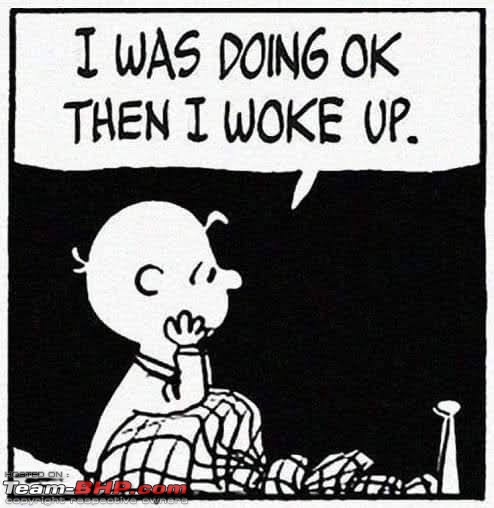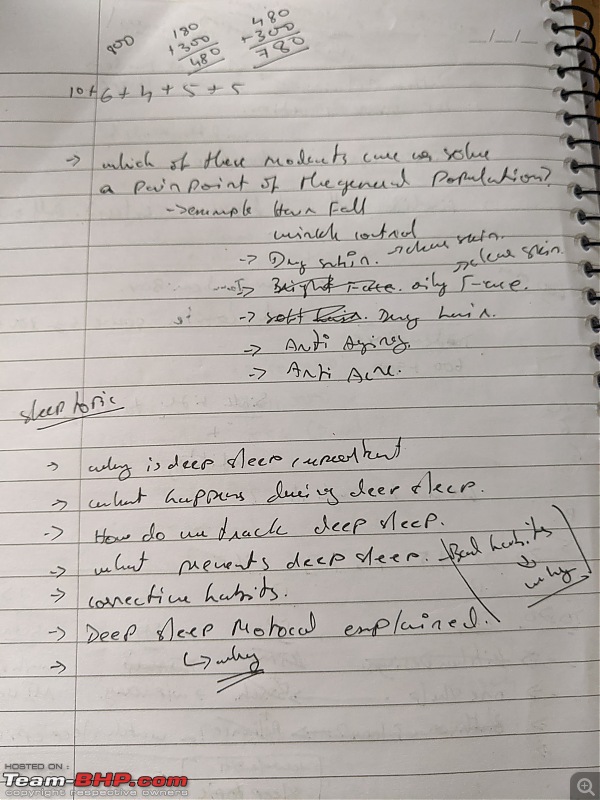| |||||||
| Search Forums |
| Advanced Search |
| Go to Page... |
 |
| Search this Thread |  22,854 views |
| | #1 |
| Distinguished - BHPian  Join Date: Aug 2006 Location: Bangalore
Posts: 5,209
Thanked: 18,044 Times
| The Good Guide to Great Sleep Last edited by Red Liner : 19th August 2021 at 11:57. |
| |  (34)
Thanks (34)
Thanks
 |
| The following 34 BHPians Thank Red Liner for this useful post: | 14000rpm, A.K., Akshay6988, am1m, Arun_S, ast.ggn, Autocaptive, av8er, charanreddy, chinmaypillay, DevilzzzzOwn, Doonite, drrajasaravanan, glovins2004, graaja, GTO, InControl, itisravi, mn2363, NPV, pun337, Rambo-RS, Researcher, rj22, saisree, saket77, sidewinder_sk, srvm, swiftnfurious, The_Outsider!, vibbs, vigsom, warrioraks, ysjoy |
| |
| | #2 | |
| Distinguished - BHPian  Join Date: Aug 2006 Location: Bangalore
Posts: 5,209
Thanked: 18,044 Times
| Re: The Good Guide to Great Sleep Too Long Didn’t Watch Poor Sleep = More Weight Poor sleep could be a reason why you struggle to lose weight. Poor sleep contributes to lower hormone levels including the Growth Hormone, Testosterone and Estrogen, which are instrumental in maintaining metabolism and losing weight. Add to this, you have lower energy levels when you wake up, and therefore lower motivation to pursue exercise. Poor sleep also disrupts appetite regulation. Sleep deprivation has shown to increase the Ghrelin hormone which increases appetite, and suppresses Leptin which controls appetite. If you’re up late at night, guess what you’re usually doing? Yup, Television + snacking away. Poor Sleep = Lower Immunity That’s right. With poorer hormone levels, you tend to risk losing your all important immunity as well. Your immunity cells also rebuild and fortify themselves during sleep. Take that away, and you’re an open invitation to the bad guys. Apparently, proper sleep also makes vaccines more effective. I just learnt that! Poor Sleep = Lower Life Span Poor sleep contributes to a whole host of bad things. That includes a rise in inflammation and cell damage, higher risks of heart disease and stroke, and reduced insulin resistance leading to Type 2 Diabetes. Here’s the kicker: A deep sleep reduction of 30% has been equated to ageing by 10-12 years. You want to take valuable years off your lifespan - sleep less. Pretty simple. Poor Sleep = Poor Productivity Bad sleep tends to affect all the three pillars of great productivity. Concentration, Cognition, and Learning. Our brains rewire and absorb what we’ve learnt during the day - and rewrite our neural pathways during sleep. Think about it like this. Learning something during the day is like putting food into our stomachs. But the digestion takes place much later, doesn’t it? And if the digestion is flawed (in the case of learning - it would be sleep), would the eating make any sense at all? The same thing happens when we learn. We don’t actually learn when we’re awake - we learn when we’re asleep. Poor Sleep = Depression and Less Emotional Intelligence Poor sleep quality - not just the duration of sleep - has been linked to higher levels of depression. As many as 90% of depression patients interviewed have complained of poor quality of sleep! REM Sleep or Dream Sleep is when all your emotional memories are processed. A kind of self activated psychological therapy is undertaken by the brain to heal emotional trauma during REM Sleep. No REM sleep means you have less emotional intelligence to deal with personal relationships and you probably have more anger issues. Quote:
https://www.medicalnewstoday.com/articles/325353 https://www.sclhealth.org/blog/2018/...l-night-sleep/ https://www.webmd.com/sleep-disorder...its-sleep-more So you want to fix your sleep? For that, we have to understand what sleep is. Last edited by Red Liner : 19th August 2021 at 11:20. | |
| |  (43)
Thanks (43)
Thanks
 |
| The following 43 BHPians Thank Red Liner for this useful post: | 14000rpm, A.K., Akshay6988, am1m, AMG Power, Arv1990, Autocaptive, Axe77, chinmaypillay, COMMUTER, dailydriver, DevilzzzzOwn, Doonite, drrajasaravanan, FloatingCanvas, GTO, InControl, mn2363, NPV, RacerByHeart, Rajjay, Rambo-RS, redohabitat, Researcher, rj22, romil.shroff, sainyamk95, saisree, saket77, sam264_2000, sandeepskarobar, Sayan, Sen, Sheel, sidewinder_sk, sri_tesla, srvm, SuhairZain, swiftnfurious, The_Outsider!, vibbs, vigsom, ysjoy |
| | #3 | |
| Distinguished - BHPian  Join Date: Aug 2006 Location: Bangalore
Posts: 5,209
Thanked: 18,044 Times
| Re: The Good Guide to Great Sleep What is Sleep? Sleep is the physiological state of the brain and body, when restoration takes place. It is the period when learning gets wired in, toxins get flushed out of the brain, immune systems go into repair mode, and the body gets prepared for the challenges that face it the next day. We have watched countless videos on Youtube, scores of “influencers” telling us, sleep is unimportant for “material” success in this world. Guess what? Healthy sleep is of paramount importance to any kind of success in this world. The very fact that healthy sleep staves off premature ageing and death gives you time for your endeavors. Honestly for everything that the duration of Sleep deprives us of, Nature should have gotten rid of this sleep function entirely. Think about it, when things were a LOT more difficult and a matter of survival during the early years of our evolution, when you slept you: - Couldn’t forage for food - Couldn’t find a mate - Couldn’t reproduce - Couldn’t care for your young - And were vulnerable to predators All of these go against evolutionary precedence, so why didn’t our biology root Sleep out? Those reasons are mentioned in Post 2 of this thread. Read that if you skipped it. One thing we should all be aware of is, if you go against the biology of your brain and body, you will pay a price. And that price is disease, impairment, sickness, and death. Quote:
Last edited by Red Liner : 19th August 2021 at 16:05. | |
| |  (31)
Thanks (31)
Thanks
 |
| The following 31 BHPians Thank Red Liner for this useful post: | 14000rpm, A.K., Akshay6988, am1m, Arv1990, Autocaptive, Axe77, chinmaypillay, DevilzzzzOwn, Doonite, drrajasaravanan, FloatingCanvas, GTO, InControl, mn2363, NPV, Rajjay, Rambo-RS, recshenoy, redohabitat, Researcher, romil.shroff, saisree, saket77, Sheel, sidewinder_sk, srvm, swiftnfurious, The_Outsider!, warrioraks, ysjoy |
| | #4 | |
| Distinguished - BHPian  Join Date: Aug 2006 Location: Bangalore
Posts: 5,209
Thanked: 18,044 Times
| Re: The Good Guide to Great Sleep The Mechanics of Sleep The mechanics of sleep are a twist of external changes outside your body and therefore hormonal reactions to that inside your body. All our bodies have something inbuilt called the Circadian clock or the Circadian Rhythm. Simply put, you sleep when the sun goes down, and you wake up when the sun goes up. But it isn’t so simple, else we wouldn’t be reading this. So what we understand is that our body seems to be tuned to the Sun rising and setting. Or to be more specific the light from the Sun. So Sunlight is important. Note that down. How do we sense this light from the Sun? With our eyes ofcourse. The eyes are actually an extension of our brain. In vertebrate embryonic development, the retina and the optic nerve originate as outgrowths of the developing brain, specifically the embryonic diencephalon; thus, the retina is considered part of the central nervous system (CNS) and is actually brain tissue. So what happens is this. When we open our eyes and sense sunlight, our brain gets a message through the eyes saying “Hey, its time to wake up!”. Similarly, when our eyes look at the evening sun light, or when the photon energy is absorbed by the eyes and converted to chemical messaging to the brain, a message is sent out “Hey, its time to sleep”. This is essentially the circadian rhythm. There are other hormonal messaging systems that get activated as part of our wake-sleep cycle. We’ll talk about the most important ones so this doesn’t become a science lecture. Melatonin - tells me WHAT TIME I should sleep Melatonin is a hormone generated by the Pineal gland. It communicates day and night as a kind of 24 hour clock to the brain. During the day Melatonin is at low levels, and by night, its levels increase. Adenosine - tells me IT’S TIME to sleep! Adenosine is released in the morning when we wake up and is released slowly throughout the rest of the day. You can call it a kind of Sleep Pressure. As it increases and reaches a threshold, you can’t keep your eyes open anymore and you fall asleep. Quote:
Last edited by Red Liner : 19th August 2021 at 11:18. | |
| |  (29)
Thanks (29)
Thanks
 |
| The following 29 BHPians Thank Red Liner for this useful post: | 14000rpm, 2000rpm, A.K., Akshay6988, am1m, Arv1990, Autocaptive, chinmaypillay, DevilzzzzOwn, Doonite, drrajasaravanan, FloatingCanvas, GTO, InControl, mn2363, NPV, Rajjay, Rambo-RS, redohabitat, Researcher, saket77, Sen, Sheel, shipnil, srvm, swiftnfurious, The_Outsider!, vigsom, ysjoy |
| | #5 | |
| Distinguished - BHPian  Join Date: Aug 2006 Location: Bangalore
Posts: 5,209
Thanked: 18,044 Times
| Re: The Good Guide to Great Sleep The Arc of a Night - What happens when we Sleep? Let’s say you go to sleep by 10.30pm. This is how your night will kind of progress. You slip into the early light stages of Non REM sleep. This is Stage 1 & 2. This takes about 20 minutes. Your heart rate drops and your brain waves slow down. Now, you start entering the deeper stages of Non REM Sleep. Stage 3 & 4. Your heart rate drops even more. You spend another 20-30 minutes here. Now the total elapsed time is about 60 minutes. From Stage 3&4, you go back to Stage 2 Non REM. And then you switch to REM Sleep period. And then back to Non REM. This goes on for 90 minute cycles. Your first half of the night is characterised by Deep Sleep Non REM as the majority of the sleep phase. Conversely, in the second half of the night, REM or Dream Sleep takes over. During both the Deep Sleep and REM Sleep phases, our brain rewires itself to absorb what we learnt during our waking hours, fixes emotional issues, engages in psychological therapy, and flushes out toxins. Contrary to what we tend to perceive, some parts of the brain are over 30% more active during REM sleep than when awake! REM sleep is also called paradoxical sleep. Why? Because your brain is active and your body is paralysed! And that's so you don’t go out and about and act out your dreams. Imagine dreaming that you’re this amazing sky diver and you walk over to your balcony and… Quote:
| |
| |  (35)
Thanks (35)
Thanks
 |
| The following 35 BHPians Thank Red Liner for this useful post: | 14000rpm, A.K., aadya, Akshay6988, am1m, Arv1990, Autocaptive, brohanv, chinmaypillay, Crazy_cars_guy, DevilzzzzOwn, Doonite, drrajasaravanan, FloatingCanvas, GTO, Harjot37, harry10, lapis_lazuli, mn2363, NPV, Rajjay, Rambo-RS, redohabitat, Researcher, saket77, Sen, Sheel, shipnil, sridhar-v, srvm, The_Outsider!, V.Narayan, vibbs, warrioraks, ysjoy |
| | #6 | |
| Distinguished - BHPian  Join Date: Aug 2006 Location: Bangalore
Posts: 5,209
Thanked: 18,044 Times
| Re: The Good Guide to Great Sleep How do we Track Sleep? The best and most effective way to track your sleep on a nightly basis is to wear a good smart watch that tracks your sleep behaviour. This is important, so you build a baseline of data to begin working from. Here’s one of my charts. 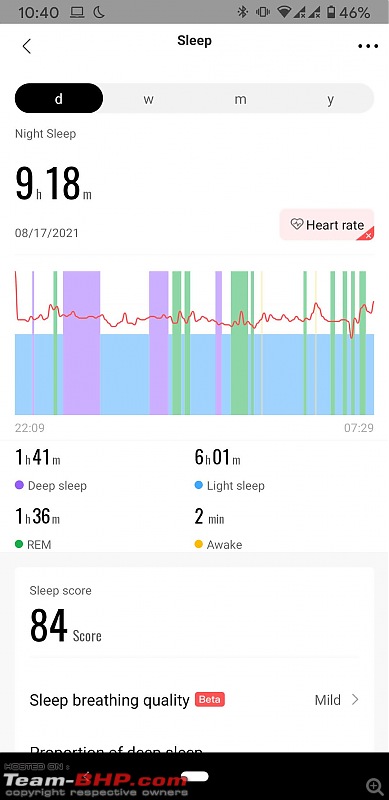 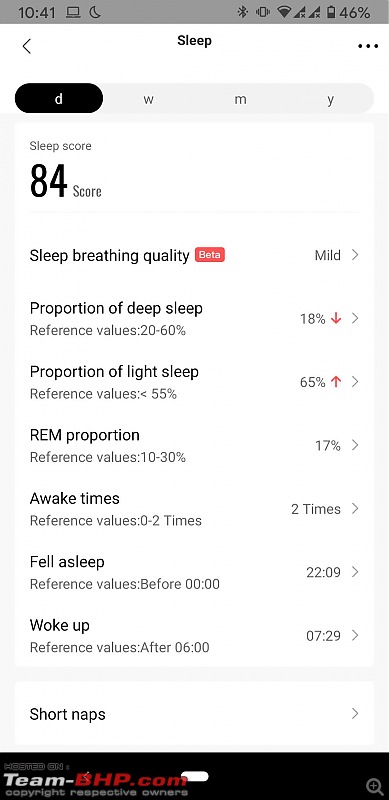 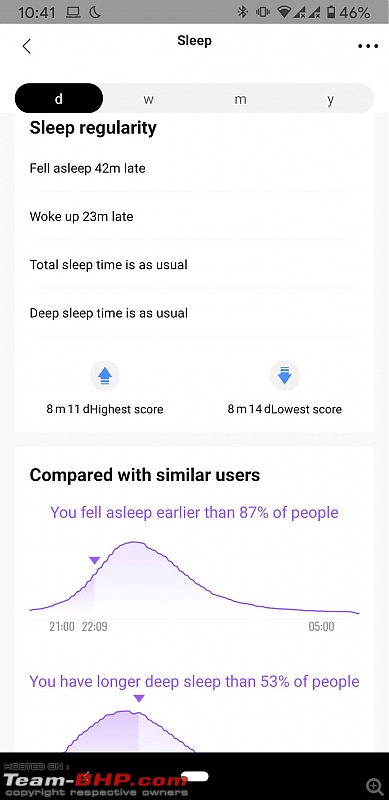 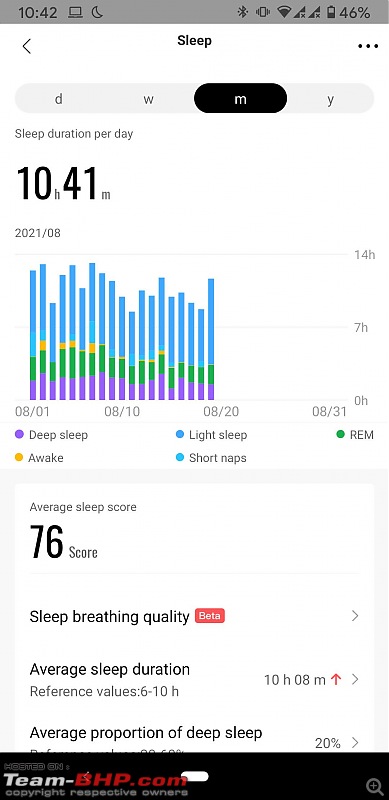 This data can help you answer different things such as: - Am I going to sleep and waking up at around similar times every day? - Is my deep sleep and REM sleep durations at a similar range day to day? - Do I have sleep breathing disorder when I sleep? This is difficulty in breathing or Apnea. Now with this data in hand, you can start introducing new behaviours or removing old ones to see how your sleep metrics change. Quote:
| |
| |  (28)
Thanks (28)
Thanks
 |
| The following 28 BHPians Thank Red Liner for this useful post: | 14000rpm, A.K., Akshay6988, am1m, Arv1990, Autocaptive, chinmaypillay, DevilzzzzOwn, Doonite, drrajasaravanan, GTO, Harjot37, InControl, jeygani, kap04, mn2363, NetfreakBombay, NPV, Rajjay, redohabitat, Researcher, saket77, Sheel, Silverfire, srvm, The_Outsider!, vibbs, ysjoy |
| | #7 | |
| Distinguished - BHPian  Join Date: Aug 2006 Location: Bangalore
Posts: 5,209
Thanked: 18,044 Times
| Re: The Good Guide to Great Sleep What behaviours or habits prevent good sleep? Coffee or Caffeine Coffee is a great wake-me-up. But it's the dose and timing that makes this poison. Remember we spoke about Adenosine? This is the hormone that builds a kind of sleep pressure, and when a lot of it builds up in your brain, you nod off to sleep. You cannot fight Adenosine. Unless you have coffee. Caffeine blocks the receptors that accept Adenosine in the brain. It outcompetes your Adenosine hormone and takes its place. That’s why you get this perceived alertness. But Caffeine does not deactivate Adenosine. So if Adenosine is not deactivated, and is continued to be produced, what happens to it? Well, it continues to be made and builds up, and keeps building up. Now you can only have so many cups of coffee, and when you stop, and the half life of Coffee ends, Boom! All that Adenosine thats packed away and waiting blows up the dam and its like a tsunami in your brain. That my friends is called the Caffeine crash. This is also what happens when you’re driving long distance late at night, and after many cups of coffee, you just cant stay awake anymore. The caffeine effect is done, and Adenosine is running rampage. You just need to sleep right now. Too much coffee wrecks your sleep patterns. Having coffee later in the day will keep blocking the adenosine, and you will sleep much later. Thereby kicking out your natural circadian rhythm. And then the next morning we wake up groggy and tired, well after dawn and we have more coffee to “wake up”. Vicious cycle repeats. Here’s what you do if you have trouble falling asleep. Make sure your last cup of coffee is 10-12 hours before normal bed time. So if you sleep by 10pm, your last cup of coffee should be no later than 12 noon! Replace coffee with Green tea later in the day. Green tea contains caffeine as well as L Theanine which keeps you relaxed with no caffeine jitters. What I do: I have a single cup of black coffee within about 2 hours of “waking up”. My waking up begins at around 5 am, and I have very light sleep between 5 and 6.30 am. I don’t just jump out of bed. At around 7 am I have my coffee and I am done. Everyone has a system of waking up. Follow what feels best for you. Quote:
Last edited by Red Liner : 19th August 2021 at 10:54. | |
| |  (30)
Thanks (30)
Thanks
 |
| The following 30 BHPians Thank Red Liner for this useful post: | 14000rpm, A.K., Akshay6988, am1m, Arv1990, Autocaptive, Bibendum90949, binoyyj, DevilzzzzOwn, Doonite, drrajasaravanan, FloatingCanvas, graaja, GTO, Harjot37, InControl, jeygani, mn2363, NPV, Rajjay, Rambo-RS, Researcher, saket77, Sheel, shipnil, srvm, Sunny_team_bhp, The_Outsider!, vibbs, ysjoy |
| | #8 | |
| Distinguished - BHPian  Join Date: Aug 2006 Location: Bangalore
Posts: 5,209
Thanked: 18,044 Times
| Re: The Good Guide to Great Sleep Naps Do you nap during the day? Well, good news first. Naps can have a positive benefit. Naps improved mission performance in NASA by over 34%. And also improved daytime performance by 50%! This promoted the NASA Nap culture during that time period. Imagine a work culture where everyone actively took a nap together at the office. Wild! But it's also a double edged sword. Adenosine is cleared out during sleep. Naps therefore clear out adenosine - in the middle of the day. You lose your built up sleepiness. This invariably makes your night sleep even worse. Because you have less Adenosine induced sleep pressure, and hence you stay up longer beyond the evening Circadian Rhythm. If you don't struggle with night sleep, please continue napping. However, time your naps to the early afternoons. Say about 1pm or so. And do not exceed 20-25 minutes of nap time. You don’t want to go beyond Stage 1 and 2 of your sleep cycle. Light sleep is more than enough to keep you refreshed. If you enter Stage 3 & 4 and beyond, you have messed up your sleep cycle. This will also ensure you wake up from your nap refreshed as opposed to waking up groggy. A healthier alternative to napping is to Practice yoga nidra instead of going to sleep outright. Quote:
| |
| |  (34)
Thanks (34)
Thanks
 |
| The following 34 BHPians Thank Red Liner for this useful post: | 14000rpm, A.K., Akshay6988, am1m, AMG Power, Arv1990, Autocaptive, Axe77, Bibendum90949, Carmine_pepper, DevilzzzzOwn, Doonite, drrajasaravanan, FloatingCanvas, graaja, GTO, Harjot37, jeygani, mn2363, NPV, Rajjay, Rambo-RS, redohabitat, Researcher, rj22, saket77, Sayan, Sheel, shipnil, srvm, Sunny_team_bhp, The_Outsider!, vibbs, ysjoy |
| | #9 | ||
| Distinguished - BHPian  Join Date: Aug 2006 Location: Bangalore
Posts: 5,209
Thanked: 18,044 Times
| Re: The Good Guide to Great Sleep Late Night Light Viewing Activities Looking at your mobile phone or Ipad in bed is the new normal. Its almost akin to a wind down ritual for most of us, me included. But its probably the worst thing to do. Without getting into the semantics of Blue light etc, its simply this. The light from your electronic devices send a cue to your brain that you need to continue staying awake to consume something important (in this case, entertainment). Therefore your brain releases cortisol and other similar hormones to help you stay awake. Now once these hormones have flooded your system, it is very difficult to turn them off and go to sleep. Quote:
Stress is a real killer. And has real ramifications to how we sleep. Most of the time, we carry all this worry related stress to our bed. And this is not a good thing. So how do we work around this? Quote:
| ||
| |  (30)
Thanks (30)
Thanks
 |
| The following 30 BHPians Thank Red Liner for this useful post: | 14000rpm, A.K., Akshay6988, am1m, Arv1990, Autocaptive, Bibendum90949, CeeBeeR, Doonite, drrajasaravanan, FloatingCanvas, graaja, GTO, Harjot37, jeygani, mn2363, NPV, Rajjay, Rambo-RS, Researcher, saket77, Sen, Sheel, shipnil, srvm, The_Outsider!, vibbs, vigsom, warrioraks, ysjoy |
| | #10 | |||
| Distinguished - BHPian  Join Date: Aug 2006 Location: Bangalore
Posts: 5,209
Thanked: 18,044 Times
| Re: The Good Guide to Great Sleep Late Evening Heavy Exercise Heavy exercise (all forms of weight lifting and Zone 3 and above heart rate training) will trigger a cortisol response in your body. Cortisol is a stress hormone. If you need to sleep, cortisol levels have to be low enough so you can fall asleep. If you perform heavy exercise late into the evening, this cortisol release coincides with the dusk light that triggers the sleep response through your eyes, effectively confusing your brain and body. Do this regularly and your body will begin adopting a new circadian rhythm. Quote:
A dinner late into the night is not the best thing to do before getting into your bed. All your body’s energy and blood rushes to your digestive system to process the food instead of your brain shutting down to sleep. Quote:
Do you have frequent wake up episodes at night? Is this bad? This is perfectly natural and normal. In fact many of us wake up at night, to toss over or sleep on our sides, and adjust positions, but are not consciously aware of it. Even if we do awaken, we normally tend to fall back asleep almost immediately. But it is certainly not normal: - If you spend more time trying to go back to sleep. - If you are consciously waking up and being aware of having woken up at night. - If this happens over 5-6 times a night Quote:
Last edited by Red Liner : 19th August 2021 at 11:27. | |||
| |  (27)
Thanks (27)
Thanks
 |
| The following 27 BHPians Thank Red Liner for this useful post: | 14000rpm, Akshay6988, am1m, AMG Power, Arv1990, Autocaptive, Axe77, Bibendum90949, DevilzzzzOwn, Doonite, drrajasaravanan, FloatingCanvas, graaja, GTO, Harjot37, jeygani, mn2363, NPV, Rambo-RS, Researcher, saket77, Sheel, srvm, Sunny_team_bhp, The_Outsider!, vibbs, vigsom |
| | #11 |
| Distinguished - BHPian  Join Date: Aug 2006 Location: Bangalore
Posts: 5,209
Thanked: 18,044 Times
| Re: The Good Guide to Great Sleep Are these actually Sleep Aids? Alcohol, Marijuana and CBD Alcohol is often used as a sleep aid. But it's anything but a sleep aid. Sedation is not sleep. It fragments your sleep - leading to frequent waking episodes. Alcohol also blocks REM sleep which is important for emotional and psychological therapy as we sleep. Need more reasons to skip the tipple? Growth hormone levels also dropped by 80% because of alcohol induced sleep. So think before you drink. Marijuana & CBD also disrupt sleep. THC in marijuana blocks REM sleep and there is also a dependency tolerance (you need more and more to get the same benefit). Sexual Orgasm and Masturbation I have made mention of sexual orgasm and masturbation as two separate and independent physiological actions, because even though the end result of an orgasm is the same, the pre and post orgasm impact on our brain and body is very different. Sex is a fantastic tool for good sleep. And good sleep is a fantastic tool for great sex! Prolactin and oxytocin are hormones generated after sex and orgasm, which naturally relax the brain and body. The act of sex also increases testosterone and estrogen which lead to better sleep. And when you get good sleep therefore, you have further increases in your testosterone and estrogen which can help with sex, physical and emotional intimacy and your relationship, because you are more rested, calm, and less stressed out. People often use masturbation as a sleep tool. But it is mostly used in conjunction with late night visually entertaining videos or P**n, which is addictive, and disrupts sleep. Usually one such video is never enough. And before you know it, it's 3am in the morning and you’re still up watching. Your overall quality of life will be poorer. Last edited by Red Liner : 19th August 2021 at 11:28. |
| |  (40)
Thanks (40)
Thanks
 |
| The following 40 BHPians Thank Red Liner for this useful post: | 14000rpm, A.K., Akshay6988, am1m, amit_purohit20, Arv1990, aswin ajith, Autocaptive, Axe77, Bibendum90949, chinmaypillay, DevilzzzzOwn, DicKy, Doonite, drrajasaravanan, FloatingCanvas, graaja, GTO, Harjot37, InControl, jeygani, kvothe_rules, mn2363, NPV, padmrajravi, Rajjay, Rambo-RS, redohabitat, Researcher, rj22, saisree, saket77, Sayan, Sheel, shipnil, srvm, Sunny_team_bhp, The_Outsider!, vibbs, Vijin |
| |
| | #12 | |||
| Distinguished - BHPian  Join Date: Aug 2006 Location: Bangalore
Posts: 5,209
Thanked: 18,044 Times
| Re: The Good Guide to Great Sleep What Behaviours Promote Healthy Sleep? Do note that I used the word behaviour. Not supplements. I am a firm believer in using new or changing existing human behaviour to go back to our natural and biological state of being. When this behaviour is implemented in the form of tools, I call them protocols. Now we’ll delve into what tools and protocols you can implement in your daily life to have great sleep. Healthy Light Viewing Behaviour Remember we discussed how early morning and dusk sunlight affects your circadian rhythm? Here’s your protocol: Every morning before the sun comes up too high, and dawn has already broken, go out to your balcony and view the sky. Do not look at the sun directly. Just the sky is enough for about 10-20 minutes. That will wake your circadian rhythm. And do the same thing at around dusk or evening light. I usually sip my morning coffee on my balcony, and take a walk in the evenings. Our ancestors had plenty of outdoor activities in the morning and evening to ensure they had adequate light viewing done. It's nothing new. Quote:
Temperature Control A lower core body temperature helps us fall asleep and stay asleep. Quote:
Dark Room Absolutely essential. Any kind of light sends a wake up signal and cortisol release in your brain, effectively destroying your nights sleep for good. Ensure you have an absolutely dark room, with thick curtains to block all external light and sound. Wind Down Rituals Sleep is not an on or off function. You can’t just jump into bed and expect to sleep the next minute. Think about it like this. Do you drive your car at 100 KMPH into your garage? Or do you wind down the gears, engage the parking brake, maybe idle the engine a little, check if you have switched everything off and then turn the car off? We have to apply this same line of thinking to our body and brain. Sometimes you might also be too wired to sleep. It's called Wired but Tired. You’re too stressed out, and the brain is full of cortisol, but the body is totally fatigued. A wind down practice helps here well. Quote:
Last edited by Red Liner : 19th August 2021 at 11:34. | |||
| |  (30)
Thanks (30)
Thanks
 |
| The following 30 BHPians Thank Red Liner for this useful post: | 14000rpm, Akshay6988, am1m, Arv1990, Autocaptive, Bibendum90949, chinmaypillay, click, DevilzzzzOwn, Doonite, drrajasaravanan, FloatingCanvas, graaja, GTO, Harjot37, harry10, InControl, jeygani, josesiju96, mn2363, NPV, Rambo-RS, Researcher, saket77, Sheel, Shreyans_Jain, srvm, The_Outsider!, vibbs, VRJ |
| | #13 | |||
| Distinguished - BHPian  Join Date: Aug 2006 Location: Bangalore
Posts: 5,209
Thanked: 18,044 Times
| Re: The Good Guide to Great Sleep Sleep Supplements that don’t work Melatonin Melatonin supplements are probably the most widely sold sleep drug on the planet. But scientific studies on the efficacy of Melatonin prove otherwise. Melatonin Supplements increased sleep time by only 3.9 minutes and improved sleep efficiency by only 2.2%. How exactly Melatonin works is still some kind of a mystery. It has been posed that Melatonin may work by dropping the core body temperature. Dropping the core body temperature by 1C throughout the night helps us sleep better. The other issue with Melatonin seems to be that more is better. The typical melatonin supplement doses are between 5-10mg. Sometimes what is written on the bottle of such supplements is completely different from what you actually find inside the bottle. In some cases the actual dosages have been much lower, but in most cases the dosages have been dangerously much higher. Your typical natural release of Melatonin is only 0.1-0.3mg. Imagine popping 10mg at one go. You are chronically overdosing without even knowing it. And the bigger issue is, once your body realises that you are ingesting unhealthy levels of Melatonin, it stops producing Melatonin by itself. Now you start a dependency cycle on this pharmaceutical drug. Quote:
Magnesium has uncompelling data for sleep. But scientific studies show that deficiency of mg contributes to low sleep quality. If you already have healthy levels of Magnesium, increasing your magnesium levels does nothing. Adequate levels are important. Quote:
Valerian root is another popular sleep remedy. Sadly, it has not proven helpful. You will find many supplements containing Valerian root extracts. Avoid them. Quote:
| |||
| |  (21)
Thanks (21)
Thanks
 |
| The following 21 BHPians Thank Red Liner for this useful post: | am1m, Arv1990, Autocaptive, Bibendum90949, chinmaypillay, DevilzzzzOwn, Doonite, drrajasaravanan, FloatingCanvas, graaja, GTO, InControl, jeygani, mn2363, NPV, RajeevSharma, Researcher, saket77, srvm, The_Outsider!, warrioraks |
| | #14 | |
| Distinguished - BHPian  Join Date: Aug 2006 Location: Bangalore
Posts: 5,209
Thanked: 18,044 Times
| Re: The Good Guide to Great Sleep Sleep Supplement that do work - kinda Tart Cherries (naturally dried, no added sugar) Tart cherries are potentially good for sleep. In a sleep study, it reduced the amount of time spent awake at night by over an hour and increased sleep by 34 minutes. Another study pegged this at 84 minutes and also decreased day time napping. Chamomile Chamomile tea is another proven sleep aid. Chamomile contains Apigenin. Having a cup or two of Chamomile tea 30 minutes before bed is a good practice. Apigenin might not directly work on your sleep, but it may work on reducing your anxiety and stress levels, which indirectly contribute to better quality sleep. Kiwis Kiwis with the skin are also good for sleep. In a human model study, kiwis helped participants fall asleep faster and stayed asleep longer. A mice model also proved the same findings. Tryptophan and Serotonergic agents Serotonin is a hormone which is a precursor to Melatonin production. If you don’t have enough Serotonin in your body, you produce less Melatonin. Serotonin is a double edged sword. It is used by the brain for both inducing sleep and keeping you up! So how do you use Serotonin? Simple - you don’t! Here’s why. Serotonin has to be modulated in very specific ways to induce sleep. This is something only the body knows how to do. For instance, even though you need Serotonin and therefore Melatonin to fall asleep, Serotonin is completely shut down during REM sleep. The way to ensure your body has enough Serotonin to work with, is to have Tryptophan rich foods. Tryptophan is a precursor to Serotonin production. Have foods rich in tryptophan, which have to be digested and allows the body to modulate serotonin release naturally. Turkey, Chicken, Nuts, Cheese, Milk, and Bread are good sources of natural Tryptophan. Quote:
Last edited by Red Liner : 19th August 2021 at 11:38. | |
| |  (24)
Thanks (24)
Thanks
 |
| The following 24 BHPians Thank Red Liner for this useful post: | Akshay6988, am1m, Arv1990, Autocaptive, Bibendum90949, click, DevilzzzzOwn, Doonite, drrajasaravanan, FloatingCanvas, graaja, GTO, Harjot37, InControl, jeygani, mn2363, NPV, Rambo-RS, Researcher, saket77, Sheel, srvm, Sunny_team_bhp, The_Outsider! |
| | #15 |
| Distinguished - BHPian  Join Date: Aug 2006 Location: Bangalore
Posts: 5,209
Thanked: 18,044 Times
| Re: The Good Guide to Great Sleep Unconventional Sleep Tips No Clocks in the Bedroom Remove all clock faces from the bedroom including your mobile phone. If you have a tough night and you look up at the clock when you wake up in the middle of the night, it increases your anxiety and you cannot drop back to sleep. I looked around my home, and we have exactly one clock in the dining area. My smart watch has a sleep function as well, and will not come on unless I press a button between 10pm and 6am. Don't compensate lost sleep If you had bad sleep the night before, don't compensate for your “lost” sleep with extra sleep time during the day, or with more coffee to wake you up. Discipline your sleep time and wake up times irrespective of what happens during the day or night. Avoid naps if you have trouble with sleeping at night. Trying to compensate by shifting your wake up and sleep times, or increasing sleep time during the day will only have bad ramifications on your overall sleep quality in the long term. A disciplined sleep schedule will ensure that you return to your normal sleep quality levels in a day or two. |
| |  (37)
Thanks (37)
Thanks
 |
| The following 37 BHPians Thank Red Liner for this useful post: | A.K., Akshay6988, am1m, AMG Power, Arv1990, Autocaptive, Axe77, Bibendum90949, chinmaypillay, click, DevilzzzzOwn, Doonite, drrajasaravanan, FloatingCanvas, graaja, GTO, Harjot37, InControl, jeygani, Machalu, mn2363, NICHE, NPV, RajeevSharma, redohabitat, Researcher, saket77, Sayan, Sheel, shipnil, Shreyans_Jain, Silverfire, srvm, The_Outsider!, VeluM, vibbs, warrioraks |
 |


